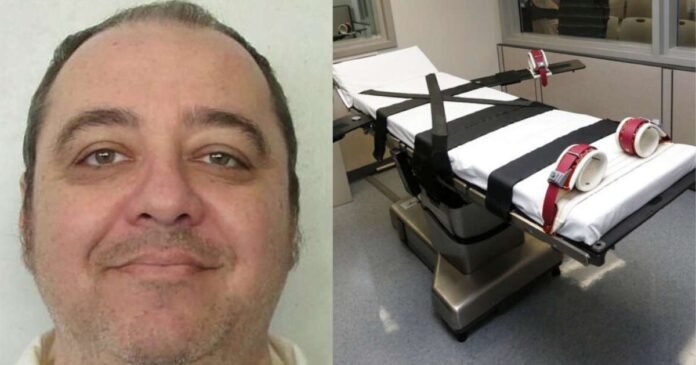Kenneth Eugene Smith was executed on Thursday night at an Atmore, Alabama state prison. A journalist who witnessed the execution reported that Smith thrashed violently during the execution, which began at 19:53 local time and concluded approximately 25 minutes later. The condemned man was convicted in 1989 for the murder-for-hire killing of preacher’s wife Elizabeth Sennett.
This new and untested method using nitrogen gas asphyxiation has raised concerns among human rights advocates. UN High Commissioner for Human Rights, Volker Turk, expressed “serious concerns” regarding the method, suggesting it might amount to torture or cruel treatment. EU officials labeled nitrogen gas as “particularly cruel and unusual punishment.”
Five reporters witnessed the execution, with one describing it as unprecedented. Alabama journalist Lee Hedgepeth recounted, “I’ve been to four previous executions, and I’ve never seen a condemned inmate thrash in the way that Kenneth Smith reacted to the nitrogen gas.” Smith’s spiritual adviser, Reverend Jeff Hood, echoed this sentiment, emphasizing the prolonged struggle witnessed during the execution.
Contrary to these accounts, state officials insisted the execution unfolded as planned. Alabama Department of Corrections Commissioner John Hamm stated, “Nothing was out of the ordinary,” emphasizing that Smith’s reactions were expected side effects of nitrogen hypoxia. The spiritual adviser’s comments about cracks in correction officials’ composure were dismissed by Hamm.
Despite the controversy, Alabama Attorney General Steve Marshall defended the method, anticipating its future use by other states. The Biden administration, however, expressed deep concern, reiterating a moratorium on federal executions. White House Press Secretary Karine Jean-Pierre termed the execution “very troubling.”
In his final moments, Smith’s last words lamented Alabama’s step backward in humanity. He left with expressions of love, peace, and gratitude for support. Smith, convicted alongside another hitman, John Forrest Parker, had participated in the murder-for-hire scheme orchestrated by Charles Sennett, a debt-ridden preacher seeking insurance money.
Mike Sennett, the victim’s son, acknowledged that Smith, who took his mother’s life, paid the ultimate price through his execution. Smith’s legal team, deeply saddened by the outcome, highlighted the jury’s initial decision to spare his life, a decision eventually overridden by a judge.
Opponents of the death penalty, including Abraham Bonowitz of Death Penalty Action, decried the execution, emphasizing the irreversible nature of such acts. Two years ago, Alabama’s attempt to execute Smith through lethal injection faced technical difficulties.
The US Supreme Court denied a last-minute reprieve on Thursday night, with three liberal justices dissenting from the conservative majority’s ruling. Despite the decline in death penalty cases nationwide, 24 people were executed in five states last year. Gallup polls indicate a slight majority (53%) of Americans still approve of the death penalty in murder cases.
